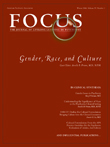Cultural Consultation: A Model of Mental Health Service for Multicultural Societies
Abstract
Objectives: This paper reports results from the evaluation of a cultural consultation service (CCS) for mental health practitioners and primary care clinicians. The service was designed to improve the delivery of mental health services in mainstream settings for a culturally diverse urban population including immigrants, refugees, and ethnocultural minority groups. Cultural consultations were based on an expanded version of the DSM-IV cultural formulation and made use of cultural consultants and culture brokers. Methods: We documented the service development process through participant observation. We systematically evaluated the first 100 cases referred to the service to establish the reasons for consultation, the types of cultural formulations and recommendations, and the consultation outcome in terms of the referring clinician’s satisfaction and recommendation concordance. Results: Cases seen by the CCS clearly demonstrated the impact of cultural misunderstandings: incomplete assessments, incorrect diagnoses, inadequate or inappropriate treatment, and failed treatment alliances. Clinicians referring patients to the service reported high rates of satisfaction with the consultations, but many indicated a need for long-term follow-up. Conclusion: The cultural consultation model effectively supplements existing services to improve diagnostic assessment and treatment for a culturally diverse urban population. Clinicians need training in working with interpreters and culture brokers.



